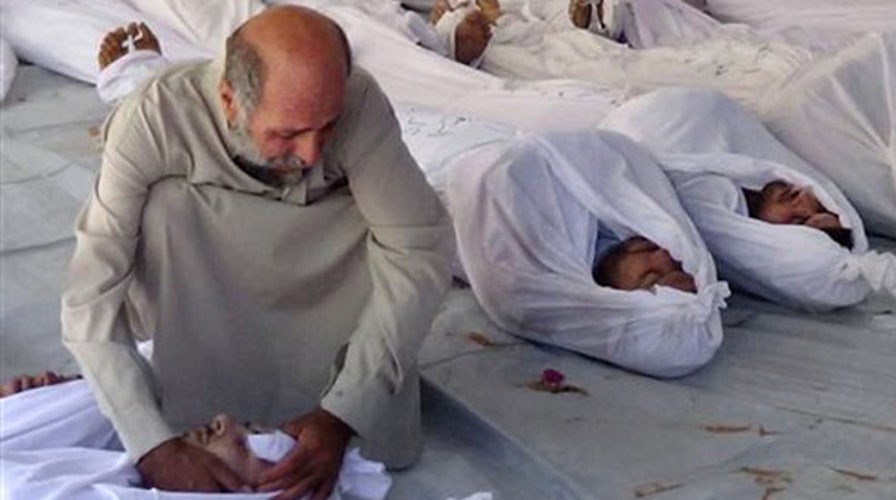Syrian rebels accuse regime of poisonous gas attack
Leland Vittert reports from Jerusalem, Israel
Syrian opposition groups say a "poisonous gas" attack during a government offensive near Damascus has left at least 100 people dead, with images showing pale, lifeless bodies of children lined up in makeshift hospitals.
Rami Abdul-Rahman from the Britain-based Syrian Observatory for Human Rights said activists in the area told him that poison gas was fired in rockets as well as from the air. He added that he has documented at least 100 deaths, but said it was not clear whether the victims died from shelling or toxic gas.
Another group, the Local Coordination Committees, said hundreds of people were killed or injured in the shelling and the Syrian National Coalition, Syria's main opposition group in exile, put the number at 1,300. The group said it was basing its claim on accounts and photographs by activists on the ground. The Damascus Media Office told Reuters that at least 494 were dead.
Such different figures from activists are common in the aftermath of attacks in Syria, where the government restricts reporting.
The government denied reports its troops used chemical weapons on Wednesday, dismissing the claims as "absolutely baseless."
The statements came as a 20-member U.N. chemical weapons team was in Syria to investigate three sites where chemical weapons attacks had allegedly occurred in the past. The timing raises questions on why the regime would employ chemical agents during a visit by the U.N. experts.
An opposition activist and a pharmacist in the town of Arbeen who identified himself as Abu Ahmad, which is not his real name, said he attended to dozens of injured people in a field hospital after the shelling on Zamalka and Ein Tarma early Wednesday, and said many were moved to Arbeen.
He said bodies of 63 of the dead had indications of a chemical weapons attack but he could not confirm this.
"Their mouths were foaming, their pupils were constricted, and those who were brought in while still alive could not draw their breaths and died subsequently," he told The Associated Press via Skype. "The skin around their eyes and noses was grayish."
Abu Ahmad, who declined to give his real name fearing for his own safety, said he based his belief that the symptoms could indicate a chemical weapon attack because he had attended to two victims two months ago brought in from Jobar, a neighborhood in Damascus, who had the same symptoms and were believed to have been injured in a chemical attack.
Activists in Zamalka told Abu Ahmed that an additional 200 people died in that town on Wednesday. Arbeen is 5 kilometers to the northeast of Damascus.
An amateur video showed four children on the floor of a makeshift hospital, apparently unconscious, as a doctor is seen giving them some sort of shots. A bit later, a child starts shaking slowly.
"Is this baby girl a terrorist?" a man could be heard saying. "God willing, we will bring his regime down. He (Assad) is killing Sunni children in front of the whole world."
"Oh, Bashar, you son of a dog," said another man. "We will come and get you in your place."
The White House said the U.S. was "deeply concerned" by reports of the attack. Spokesman Josh Earnest said the White House had requested that the U.N. "urgently investigate this new allegation."
"If the Syrian government has nothing to hide and is truly committed to an impartial and credible investigation of chemical weapons use in Syria, it will facilitate the U.N. team's immediate and unfettered access to this site," Earnest said.
The U.N. later said Wednesday afternoon that it was holding emergency consultations over the attack.
France President Francois Hollande, speaking Wednesday at a regular Cabinet meeting, said the latest allegations "require verification and confirmation," said the government spokeswoman Najat Vallaud-Belkacem.
Swedish chemical weapons expert Ake Sellstrom, who is heading the U.N. team in Syria, said a formal request from a member state to investigate the purported attack would have to come through the U.N. channels and Syria would need to agree.
Syria is said to have one of the world's largest stockpiles of chemical weapons, including mustard gas and the nerve agent sarin. The government refuses to confirm or denies it possesses such weapons.
In June, the U.S. said it had conclusive evidence that Assad's regime used chemical weapons against opposition forces. That crossed what President Obama called a "red line," prompting a U.S. decision to begin arming rebel groups, although that has not happened yet.
Wednesday's claim of the chemical attack, if confirmed, would be the most serious since the March 19 incident in Khan al-Assal when at least 30 people were killed. Assad's regime and the rebels have blamed each other for that attack.
Unrest in Syria began in March 2011 and later exploded into a civil war. More than 100,000 people reportedly have been killed in the conflict.
The Associated Press contributed to this report.

